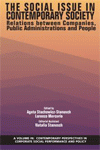
The Social Issue in Contemporary Society
Relations Between Companies, Public Administrations and People
Edited by:
Agata Stachowicz-Stanusch, Silesian University of Technology, Poland
Lorenzo Mercurio, University of Naples Federico II - Italy
A volume in the series: Contemporary Perspectives in Corporate Social Performance and Policy. Editor(s): Agata Stachowicz-Stanusch, Canadian University Dubai.
Published 2019
It is widely observed that societies are changing, and new social issues are raising. The relationship between actors in the global environment and in the local as well, is changing because of financial crisis, new technological revolution, climate change, richness reallocation and concentration. We can see that value creation and management models in organizations are often uncoherent with the satisfaction of needs. The ability to create competitive advantages on a financial level seems to be increasingly developed. This can be sustained by the clear trend that leads companies to grow in size or create strong groups by shifting uncertainty over the weaker part of the market and unorganized systems and citizens. In this misalignment, empty spaces in the economic environment are opened. These spaces are those where the action of the public system can no longer be effective (or where it has never been) and where, more and more, the private interests are weak or absent. New wants are emerging in these areas and traditional models are no longer able to answer many of these needs.
The book “The Social Issue in Contemporary Society: relations between Companies, Public Administrations and People” originates from a huge number of questions with the social issue as “fil rouge”. In this perspective, the book is divided in four parts: “Introduction”, “New Models and Tools for Public Administration”, “New Models for New Companies” and “New Models for New Societies”.
A range of scholars that authored that book provide us with a different point of view about the problem that is underlined in the book title. We hope it will be a worthy inspiration for who dream a new idea of society.
CONTENTS
PART I: INTRODUCTION. The Social Issue in Contemporary Society: Relations Between Companies, Public Administrations and People, Agata Stachowicz-Stanusch and Lorenzo Mercurio. PART II: NEW MODELS AND TOOLS FOR PUBLIC ADMINISTRATION. Political Discontinuity and Perceived Uncertainty: A Behavioral Analysis of Public Top Managers in Italy, Filomena Buonocore, Davide de Gennaro, Maurizio Decastri, and Alessandro Hinna. Proactive Management for Effective E-Learning Education in Public Institutions: Personality, Learning Styles, and Organizational Context, Paola Briganti, Luisa Varriale and Paolino Fierro. Discovering the Grey Zone between Corruption and Whistleblowing: Histories from the Italian Public Administration, Andrea Tomo, Ernesto De Nito, Gianluigi Mangia, Paolo Canonico, and Stefano Consiglio. Embedding Distributed Systems into Organizations: How Blockchain Reinforces Transparency And Accountability in PA’s New Governance Models, Francesco Bolici, Annalisa Castelli, and Alessandro Hinna. PART III: NEW MODELS FOR NEW COMPANIES. New Governance Model: A New Management Model for a VUCA World, Vittorio D’Amato and Francesca Macchi. The for Benefit Company (fBComp): Business Model Able to Link the Social Firm Legitimacy with Investment Profit, Maria Antonella Ferri and Gianpaolo Basile. PART IV: NEW MODELS FOR NEW SOCIETIES. Cities Designing the Future, Mauro Romanelli, Concetta Metallo, Rocco Agrifoglio, and Maria Ferrara. Social Media for Knowledge Sharing in a Higher Education Institution in the Sub-Saharan African Context, F. Di Virgilio and S. Asunka. Social Innovation in Healthcare Service Provision: An Ongoing Analysis of the Italian Experience, Paolo Canonico, Mariavittoria Cicellin, Stefano Consiglio, and Adriana Scuotto.
-
Paperback9781641135580
Web price: $45.04 (Reg. 52.99)
-
Hardcover9781641135597
Web price: $80.74 (Reg. 94.99)
- eBook9781641135603

- POL029000 - POLITICAL SCIENCE: PUBLIC POLICY: Social Policy
- POL017000 - POLITICAL SCIENCE: Public Affairs & Administration
- BUS052000 - BUSINESS & ECONOMICS: Public Relations
-
 Academic Social Responsibility
Sine Qua Non for Corporate Social Performance
Academic Social Responsibility
Sine Qua Non for Corporate Social Performance
-
 Artificial Intelligence and its Impact on Business
Artificial Intelligence and its Impact on Business
-
 Contemporary Perspectives in Corporate Social Performance and Policy
The Middle Eastern Perspective
Contemporary Perspectives in Corporate Social Performance and Policy
The Middle Eastern Perspective
-
 Fostering Sustainability by Management Education
Fostering Sustainability by Management Education
-
 Management Education for Corporate Social Performance
Management Education for Corporate Social Performance
-
 Mastering Anti-Corruption
The Practitioners' View
Mastering Anti-Corruption
The Practitioners' View
-
 Organizational Social Irresponsibility
Tools and Theoretical Insights
Organizational Social Irresponsibility
Tools and Theoretical Insights

